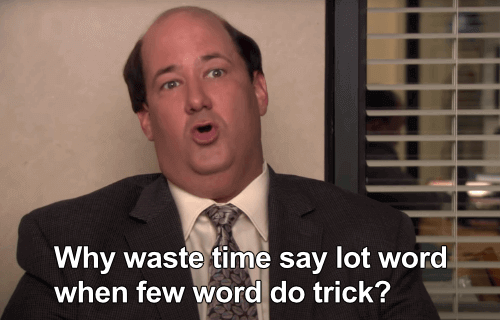Question above is pretty blunt but was doing a study for a college course and came across that stat. How is that possible? My high school sucked but I was well equipped even with that sub standard level of education for college. Obviously income is a thing but to think 1 out of 5 American adults is categorized as illiterate is…astounding. Now poor media literacy I get, but not this. Edit: this was from a department of education report from 2022. Just incase people are curious where that comes from. It does also specify as literate in English so maybe not as grim as I thought.
If you don’t understand, start walking further away from the cities.
If you still don’t understand, you’re not done walking.
To add to this, I think people often underestimate how “easy” it can be to function in society without being able to read well. I know that some folks who either don’t read at all or read at a very low level have just gotten used to interpreting the world around them without the language part. For example, visually recognizing a username and password field on a website and knowing what they’re for, or recognizing the symbols and colors used for certain objects or meanings, all without the actual words needing to mean anything to them for them to understand what it is and what to do with it. And for those who can read at a 5th or 4th grade level (and would thus be included in the stat mentioned in this post), they’re likely then very capable of reading and understanding the majority of text they’re going to come across in their day-to-day lives.
Of course, I don’t want this to sound like I’m saying being illiterate is easy, I’m sure it creates MANY barriers and difficulties for the person, but I do think humans are also flexible and resilient, and are able to survive using other cues.
It sounds so much harder than just reading.
But I believe it. I work in law and often need clients to respond in writing to questions (so we have a record of their answers). The barely-coherent poorly-spelled responses we get are astonishing - and often from pretty well educated, smart people with high level jobs (after all, they can afford a lawyer).
You have it backwards actually. You need to walk further into the cities to see the really poorly-educated.
Here’s the actual data. Look at Illinois for example. All the rural counties are right around 8% functional illiteracy. Then Cook County (Chicago) is literally double at 19%. The trend seems to repeat in every state. Queens and Brooklyn are the most illiterate parts of NY, while far-away Ontario County is the most literate.
The only real exception is in the Southwest. California’s most illiterate county is rural Imperial County with a whopping 41% illiteracy because of all the immigration.
There’s a slight gradient in literacy when looking at grade level but it’s not really accurate with illiteracy. Seems cities can still have a considerable population that can’t read.
Home schoolers/child abusers are everywhere.
Note: Not talking about legitimate, regular curriculum, “online school” for kids that can’t attend normal school for whatever reason, (e.g. bullying, immunocompromised, etc). I’m referring to religious/cult garbage home schooling stuff that doesn’t teach kids much of anything. Parents that put girls through these programs often end them at the fifth or sixth grade (because that’s all they need to be “good wives”).
If you think the problem is in the countryside, you’ve never been to New York City, and particularly the Bronx.
I grew up in New York city, and lived in the Bronx. Most of the people living there are literate in their mother tongue, less so in English. Is that what you were trying to say?
No. What I meant to say is that native English speakers in the Bronx have poor literacy rates.
https://www.norwoodnews.org/bronx-barriers-literacy-challenge/
Right?
Walk far enough into certain cities and you’ll see the same problem. It’s very closely tied to socio-economic class and a self perpetuating problem.
So I am a researcher by trade in this field, got a PhD, and develop these kinds of stats (at a more local level). I also have taught basic adult literacy for about 15 years. I think the poster was likely referring to an NCES stat.
We tend to think of adults with low English literacy as people who dropped out of school or never went. We also tend to think “illiterate” is binary, you can read or you can’t. But the definition is based around grade-level reading (what can you identify and synthesize from standardized text in English in a given time frame) and inclusive of a broader population. We’re talking about people who can’t pick up a copy of USA today and tell you the main idea of a front-page article. They can drive, they can work, etc. So they get along and this issue get ignored.
For example, some stats on illiteracy will count “non-participants” among those who can’t read/write, but this includes people in the study with cognitive disabilities or language barriers to the point that they can’t take the reading test. The share of U.S. adults who are functionally illiterate in English includes some non-native English speaking adults and also a couple generations of folks with reading diasbilities who passed through school, AND people who didn’t read for myriad other reasons.
I have tutored older adults learning to read/write for many years and have met a lot of people who ran businesses or raised families or worked full careers before learning to read. Adaptable and clever bunch. And even many U.S.-born native English speakers who got shuffled through high school despite serious disadvantage and/or disabilities.
people who can’t pick up a copy of USA today and tell you the main idea of a front-page article
Thanks! Suddenly America makes a lot of sense now.
Very interesting read! I’m from Germany and taught myself English. I’m currently at a C1/B2 level (it’s a European standard I think?) and consider myself good enough to move through English speaking countries independently just fine.
I’m basically studying English every day by reading and watching YouTube exclusively in English. Love it!
It’s a shame that many people don’t bother honing their language skills.
That’s really impressive, I do wish I took learning another language more seriously when I was younger. Everyonce Ina while I try to dig back into it but lose motivation for one reason or another.
What did you find to be the most helpful starting out?
With English, finding the motivation is easy, since pretty much all media, be it movies or games, is in English. I learned the basics in school, but most of my vocabulary is from games.
I have been thinking of learning fourth language, but it’s hard to find a good enough reason for it. Maybe I should just change games to appropriate language? At least it would improve replayability, since 90% of the plot would be missed.
deleted by creator
Thanks for the pointers! For context, English is my only language, but the premise applied to other languages is the same, so thanks!
the definition is based around grade-level reading (what can you identify and synthesize from standardized text in English in a given time frame) and inclusive of a broader population. We’re talking about people who can’t pick up a copy of USA today and tell you the main idea of a front-page article.
Purely anecdotal, but I know someone who is a tenured professor at a university that will flat out refuse to answer any question that has too much supporting detail around it. As in, if you say “for this part of the assignment, I’m doing…” and proceed to describe your attempt at problem solving over four or five sentences, asking if what you’ve done is correct or close to it, and he will simply respond with “there’s too much here to unpack, sorry,” and refuse to answer the question. But if you do it in person, like verbally read out the same paragraph you wrote, he can understand and answer it. There’s other things, too. He can type out simple sentences, but has a very poor grasp of spelling, frequently getting very simple words wrong (think different versions of there, their, and they’re). It’s genuinely baffling how he got to that point, but he also hasn’t ever really published material and it kinda makes sense why. Dude has a doctorate in a STEM field and I think the reason for that is that he can understand mathematics, but literally can’t understand complex writing. Any idea that takes more than a single sentence to explicate just evaporates out of his head.
I’ve never seen anything as extreme as you describe, but when I took the GRE I met a guy kind of like this. After you finish the exam it gives you an estimate of your score, but your real scores are sent to you weeks later. On the way out some guy asked me how I did (fairly well but not 97% plus on anything). He was like “oh damn if you don’t get above 95% on math then you can’t go to grad school in STEM lol”. I asked him what he got in the reading and writing and he said <33% “but that isn’t important for grad school” lmao
Sounds like dyslexia
deleted by creator
Because the government, federal and state level (especially conservative) hate public education and fight to defund it as much as possible. Largely because an educated populace is a dangerous populace. Especially when your political platform relies on identity politics, culture wars, cheating, screwing over the poor, opposing minorities, religious fundamentalism, and any other regressive, oppressive bullshit you can think of. They want stupid voters that they can point at “the enemy” and pit against each other to distract them from facts, all so they can stay rich and powerful.
It’s because a lot of conservatives believe in a really screwed up, masochistic, bastardized version of Christianity that prioritizes vengeance, punishment, and anger. It ignores the love, kindness, acceptance, and mercy (ie the actual teachings of Jesus) that make society work well.
So, when kids come home with these new ideas about kindness and acceptance, because being kind to a gay classmate is a great way to demonstrate the love real Christianity teaches and society values, the parents freak out. They push to ban books, fire teachers, and move their kids to private schools that more match their hate filled, divisive worldview. Education polluted their child with abnormal, liberal indoctrination, like being kind, empathetic, and accepting of others.
I an attempt to steer their children back to their core values of hate and divisiveness, they lash out. Any pushback the parents feel in response becomes persecution, because of course “the world” would disagree with them. They’re the TRUE Christians afterall. So they isolate in ecochambers, and they get more hateful. Any difference of opinion is met with derision and just simply validates their position. And despite being the TRUE Christians, or REAL conservatives, they become less Christian and less conservative every day, instead just becoming these weird, evil, empty husks of people with no real values or ideals outside of hate.
undefined> schools clearly.
4 2
No single answer is comprehensive enough to explain the low literacy levels in the US. That’s because some of the contributing factors include:
- Parents with little schooling.
- Lack of books and reading encouragement at home.
- Dropping out of school.
- Difficult living conditions – including poverty.
- Learning disabilities.
Each of these topics has social and political implications and we, as a society, have made choices that privilege the rich and the least vulnerable. Our immediacy leads us to focus on inflation rates, employment, and reelection (don’t get me wrong, these are essential points). But we should also seek solutions to bring parents back to school, campaign for more books at home, and improve schooling to prevent dropout.
The discussion of U.S. illiteracy gets gloomier when we consider the differences between “literacy” (reading, writing, and math skills) and “functional literacy” (the practical use of these skills to manage daily life and improve socioeconomic well-being).
There’s a long and rocky road to reverse this picture, and some of the possible solutions to promote higher levels of literacy in society should take into account:
- low income resources
- stigma and shame
- lack of awareness
- limited access to education
- technological barriers
- limited funding for literacy programs.
So, how is it possible that roughly 50% of Americans can’t read above a 6th grade level and how are 21% just flat out illiterate?
All of the above, and probably more!
Your response is definitely the best one here. There’s just so many factors at play, and Covid was the perfect storm that amplified all of them.
COVID-19 turned into a perfect storm as most schools were unprepared for remote learning. Add to that the fact that many students had no access to a reliably fast internet connection and the whole literacy picture gets rather bleak. Thanks for sharing your views on my perspective.
Part of the reason so many can’t read above a 6th grade level is that they are always written to on that level. Anything written for any commercial purpose is always written at a low level so any idiot can understand the menu / read the packaging / consume the magazine ad / whatever. Commercial writers write for the lowest common denominator and to an extent, news media do as well.
So a 6th grade reading level is really all you need to get by. Unless you actually read books or opt for The Economist or something else that doesn’t assume you’re a moron, 6th grade level is all you’re gonna see.
There’s some utility in this. Simpler language is also lowest-common denominator for second-language-speakers, of which we have many. Another reason to use it.
It’s also important to note that a low reading grade level for writing is not “bad writing.” Most novels fall somewhere between 5th and 7th grade reading levels. Stephen King is typically around 6th grade, and Jane Austin was often at about 5th grade, for examples. There are plenty of writers who convey complex stories and themes at even lower grade levels, and it’s not unheard of to read a complex story at even a 4th or 3rd grade level. In many contexts a low grade level does not mean the content is simple or dumbed down–it’s just a measurement of the conveyance or style of the writing.
Thank you for writing that in 6th grade English
Republicans.
They want everyone uneducated because the more educated you are, the more likely you are to vote democrat. Hence all the defunding of school programs
They want you uneducated so you’re not able to comprehend the nigh infinite ways they’re constantly chipping away personal freedoms and enriching themselves and their corporate benefactors. So they can dismantle public institutions and replace them with private for-profit businesses.
They also love ruining things so their mindless voters vote to defund it.
This disaster did not come about by accident. The whole country has allowed our public schools to decline, but the conservatives have been actively working to destroy them since the 80’s. They have been leveraging racism, fundamentalism, and other prejudice-based fears to undermine the curriculum. Meanwhile, they have cut school funding, made teaching a terrible job, and downplayed the value of formal education. Educated people are much harder to manipulate. A minority trying to hold onto power needs a public that is poorly educated and without critical thinking skills.
As the spouse of a teacher, I completely agree. Add to that the complete lack of authority the schools and teachers have. You can have a child that desperately needs assistance but if the parents say no or are just lazy, nothing can be done. I have repeatedly been exposed to just how gutless the school district is here and I assume it is the same in most US schools. They are terrified of parents being upset with the to the extent that classrooms become unmanageable because of one troubled student who is allowed to run amok because the school won’t do anything and their parents don’t care.
As a school psychologist who completes academic assessments when identifying students with learning disabilities, COVID skyrocketed these numbers. There’s just not a lot of motivation for kids anymore. The future is here and is making our population slowly illiterate.
That ‘motivation’ bit is so important. Former educator, currently still working in education, and I’m always wary of anything that makes a sweeping statement about ‘the kids’ not being ‘all right’. But there are important, substantial contributors to undesirable outcomes that need to be acknowledged. Poverty being one, as well as the cycle of poverty and abuse which is deeply tied to white flight and de-industrialization (which we might collectively assign to the death of the American dream if we aren’t too concerned with being precious about the the notion of patriotism).
Saying ‘iPads’ or ‘TikTok’ is the culprit doesn’t help anyone. But iPads and TikTok are contributing factors because they both exacerbate the feeling that being entertained is enough to scrape one’s way through life at the bottom of the barrel of expectations…as well as over-informing young people (and adults) that there is positively nothing left to look forward to. Industry is collapsing, housing and transportation are unaffordable, everything you once expected to purchase (and let’s not get lost talking about purchasing as a metric for determining whether one is living a good life) has now moved to an ever-bleeding subscription model; inflation is compounded by corporate greed (and maybe we should talk about how the business incentive of endless growth contributes to every other problem) and corporate greed (something no one but the executives and their shareholders can influence, let alone control) is raping all the natural splendor, wealth and even health and stability of the very ground we walk on and air we breathe.
Why the fuck wouldn’t some young person whose future job prospects (which were shit to begin with) are being devoured by AI, just turn toward the boundless font of readily accessible entertainment rather than going uphill toward seemingly fruitless self improvement? Why would they bother to rise to the level of literacy that allows them to appreciate a 19th century classic translated from the original Russian, or to parse the dense theming of some modern masterpiece? What’s the reward, to someone whose entire life to this point has been flavored with instant gratification? To them it’s all just ‘content’, and there’s plenty of content more accessible than literature. Art may mean nothing for many reasons, not least of which is it can be falsified to a level of acceptability (AI songs by dead artists, for example).
It’s a Twilight Zone, Black Mirror, Brave New World living nightmare. But what is the alternative? What systems or entities or organizations are coming to save the day? There are none. This moment is a gruesome forbidden experiment: it is a post-Reaganite, neoliberal race to the cultural bottom, and the youngest generation are the lab rats.

The weird part is because a lot of people don’t know what illiterate means…
They think these people can’t read a fast food menu and words just look like chicken scratch.
The definition of illiterate is “unable to read or write.”
That pretty much sounds like what you just said. What do you think it means?
There isn’t much nuance in the definition.
Illiteracy in developed countries usually refers to functional illiteracy, not a complete unfamiliarity with letters and words.
Functional illiteracy means your ability to read and write is insufficient for you to function effectively in society. Functionally illiterate people may be able to read to some limited extent, but might read too poorly or slowly to process the types of written information they encounter on a day-to-day basis. These people would not be able to understand forms at the doctor’s office, the instructions on their taxes, the terms of credit card agreements, the contents of important mail, and other material that might be important for them to understand.
Yeah, I was going to ask if that’s the number for functional illeteracy. I know it’s shockingly high in the US but it’s not the same as being illetirate.
There are levels of illiteracy. Most everyone has some literacy but the classifications are not very detailed, so completely illiterate may include being able to read a menu and choosing simple items.
Following an instructions manual for assembling/mounting something is much harder. Because of how frowned upon illiteracy is people who are illiterate get good at hiding their illiteracy.
An uneducated population can’t educate itself.
My girlfriend is a math teacher, the number of middle schoolers that can’t do basic multiplication before is surprisingly high. Yet the schools keep passing the kids. I remember learning multiplication as a 4th grader, if I hadn’t, I would’ve never passed.
My niece from Florida came to live with me in December, just finished fifth grade and I was stunned that she doesn’t know her multiplication tables. My kids In Pennsylvania learned them in 3rd grade a few years ago.
Does she understand the concept of multiplication though? That’s ultimately the important part.
Learning rote things like multiplication tables seems kinda silly in a world where Google can just do the math for you. But the important thing is to be able to recognize when multiplication is useful.
Exactly. I didn’t learn multiplication tables, but instead, my teachers taught what multiplication was and how to do it. Sure, after practicing how to do it I memorized a lot of basic math facts, but it was more important that I understand what I was doing rather than just knowing that 9×5=45. Then again, my parents saw the sorry state of public schools (both teachers) and made sure that I was sent to a decent private school after seeing the travesty of the local public school’s reading curriculum.
There are still plenty of instances where doing arithmetic quickly in your head is useful (figuring out a tip at the cash register, for example) that memorizing it can have advantages.
I agree that mental math is useful, but in scenarios like that, times tables aren’t really useful since the tables are rotely memorized and rarely does a bill fall nicely into a times table.
Better to learn a technique like “move the decimal place left one position and double that number to get 20%”.
But realistically, with a phone in your pocket, it’s not much more effort to pull it out and use the calculator.
It’s unfortunate, but the school systems seem to be fine with the problem these days. The teachers are underpaid and furious these days with the school boards.
Sadly if you don’t make noise in your area and get other parents rallied, the administrators are continuing to “cut costs,” and the kids who aren’t in private schools are effected.
Damn. We knew our 2–12 times tables by end of grade two. By the fourth, multiplication was standard and we started algebra concepts in the fifth. I can’t imagine being in highschool and not knowing primary things. It makes me wonder what they did all day for years.
Yeah, you’re likely younger and I’m dating myself lol. But I know they started teaching it earlier, a few years later.
Everyone is very focused on recent history. What about the huge amounts of aging immigrants in the USA that migrated here for a better life in the 50s-70s from poor countries and no education? They just worked their ass off and reading wasn’t a priority. My father was a poor shepard, no education and illiterate but he hustled and retired early and put me through college to be an engineer. It seems improbable but it is possible for someone to be illiterate and wildly successful and contribute a lot to society and culture.
That’s still a pretty small percentage overall, and I bet they drove up overall numbers as immigrants often stress education. My wife’s family are immigrants from the 70s and all the kids and grandkids have at least college degrees and a majority have masters degreea
Shepherd*
Shepard is a name
deleted by creator
That’s still a pretty small percentage overall, and I bet they drove up overall numbers as immigrants often stress education. My wife’s family are immigrants from the 70s and all the kids and grandkids have at least college degrees and a majority have masters degreea
That’s still a pretty small percentage overall, and I bet they drove up overall numbers as immigrants often stress education. My wife’s family are immigrants from the 70s and all the kids and grandkids have at least college degrees and a majority have masters degreea
That’s still a pretty small percentage overall, and I bet they drove up overall numbers as immigrants often stress education. My wife’s family are immigrants from the 70s and all the kids and grandkids have at least college degrees and a majority have masters degreea
That’s still a pretty small percentage overall, and I bet they drove up overall numbers as immigrants often stress education. My wife’s family are immigrants from the 70s and all the kids and grandkids have at least college degrees and a majority have masters degreea
Income disparity, communities where education isn’t supported, underfunded education, book burnings, tv/internet/gaming they’ve all had an impact. Add covid to the mix and burnt out parents and it’s all coming to a head
As a non-native English speaker, suddenly I feel more proud of myself.
You probably should. I know a handful of people for whom English is not their first language. I’m usually surprised and impressed when they tell me how long (usually not very long) they have been speaking it and their conversational English is quite good.
Especially since English syntax and usage can be super weird and inconsistent.
The republican right wing has been de-funding public schools and decrying all education as leftist indoctrination for about 50 years.
Actions have consequences, or in this case, results.🥇 take this.
Because you have a deleterious government that has purposefully de-prioritised education in order to command greater control over a brainwashed population.
Americans seem especially averse to paying taxes. Makes sense when you see where those taxes usually go (not education)
Same everywhere. I think 53% of people in Quebec are functional illiterate. There is an article today about French students being illiterates too.
The educational system wants this. I start to think it’s by design.
As in they’re literate in English but the government decided to stop offering services in English thereby making citizens functionally illiterate?
The same applies in the ROC (Rest of canada) when dealing with their French minority. Latest example is in New-Brunswick where the premier faces an onslaught by eliminating the French as a second language programme.
Alberta done that in the 1920’s without recriminations by closing down French only schools.
Ontario is not better underfunding French services.
I don’t disagree.
i’m guessing peobably the opposite? they’re literate in french but the national test is in english.
No, nothing to do with language. Functional illiterate means you can read, you know how to read, but you don’t really understand the meaning of what you are reading. Maybe Trump is a functional illiterate for instance :)
@toosoon You must be ill-informed, quite biased and in favour of Québec bashing. The government has English translations available for its minority in “La belle province”. Educate yourself. The information is out there.
http://www.education.gouv.qc.ca/fileadmin/site_web/documents/publications/DepStatAlpha_eng.pdf
That’s all well and good, until you read about bill 96…
I’m a frog, kiss me. Bill 96 is excellent as tabled . I don’t need to wait. If you’re not happy with it, do like me and GTFO . You are ROC material to light up the culture war. Join them and you will feel more at home. You must be too illiterate to be able to read between the line or fucking blind.
I’m sorry I genuinely could not follow most of that word salad. Care to try again, preferably in English this time?
Speak White, you say. Hmm… … bigot! That is why we will never cross the cultural divide between the two solitudes in canada if on either side we refuse to acknowledge our differences.
Feel free to speak in whatever ethnicity you want so long as type out a full sentence with at least a hint of what your point is trying to be.
The problem with your last comment isn’t slang words or grammar, it was a complete lack of logical flow and endless run-on sentences with no point to be found anywhere.
I’m a frog, kiss me. Bill 96 is excellent as tabled . I don’t need to wait. If you’re not happy with it, do like me and GTFO. You are ROC material to light up the culture war. Join them and you will feel more at home. You must be too illiterate to be able to read between the line or fucking blind.
Not everywhere, in Saudi Arabia it’s between 3% and 0.6% illiteracy amongst adults.
Functional illiteracy isn’t the same thing as illiteracy.
Just checked and apparently worldwide the average is around 15% functional illiteracy…

















